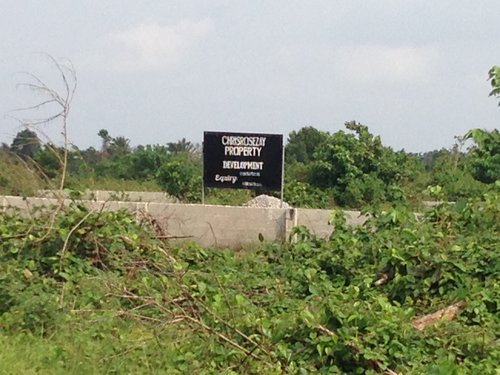By Temilade Aruya
Buying a piece of land in Lagos State and putting up a structure on same is usually a tall order, no thanks to the belligerent activities of land-grabbers and land speculators popularly known as omo onile who make life unbearable for intending house-owners through their voracious, frivolous demands. There have been many instances where unsuspecting buyers paid for land only to be told to come and pay again to reclaim their land, or settle some aggrieved family members who were not factored into the sharing formula of the previous payment.
The omo onile simply have no regard for the law of the land, as they have become a law unto themselves, charging prospective land-owners absurd bills as it pleases them. They also ensure the buyers are not free from their strangulating grip, as they exact different fines on them at every stage of the development of their properties. Prominent among such fines are foundation bill, lintel bill, decking bill, roofing bill, fencing bill and a whole lot more. The value of such bills could sometimes be equivalent to the total value of the land or a little less depending on their scale of relevance and location of the property.
In addition, they employ the use of force and threat in collecting these monies from their victims who are at their mercy with no option or defence. Some of their victims have had their structures demolished, as the omo oniles storm their sites in commando style, wielding harmful weapons and attacking the workers on site. Property owners are often mercilessly beaten up, wounded and forced to stop work until payment is made. Through this trend, land-grabbers have successfully stalled the development of many projects.
Consequently, in Lagos, individuals and organisations planning to put up structures have learnt to factor the cost of the urchins into their expenditure. This has not only hindered development; it has also made individuals and organisations to consider relocating to neighbouring states where the activities of land-grabbers are not so pronounced.
The activities of land-grabbers are not only illegal, but anathema to society, development, peace and progress. They speculate on land with little or no recourse to land use laws, as they engage in the illegal sale of government land to gullible individuals. They sometimes even dispossess people of lands that are legitimately bought from the government. They also sell lands with no proper planning or cognisance of a mapped out environmental outlay. This is especially so, with new satellite settlements in the state’s suburbs. Some houses within such locations don’t have access roads, as other houses have been erected on their path; more appalling, some are built under high tension power cables.
Although some of the notorious omo oniles are known, the society is helpless in dealing with them.
To stem the tide of the omo onile nuisance, there is a need for accurate and efficient record-keeping where the history of every property is preserved and conscientiously kept and protected. The courts are congested with land cases because landed properties are not properly documented.
It is not in doubt that the state has recorded enormous loss to the unlawful activities of these hoodlums, most of whom are layabouts, opportunists and exploiters who go about rubbishing the image of the state. It is in order to decisively tackle this nuisance that the state government recently inaugurated a task force to check the menace of land-grabbers in the state.
The task force is saddled with the task of reducing to the barest minimum activities of individuals or corporate entities that use force and intimidation to dispossess or prevent people or organisations from acquiring legitimate interest and possession of property acquired through the state government or private transactions. The task force is also empowered to co-ordinate the efforts of various agencies of government charged with enforcing the state government’s rights over lands in Lagos; and to work with all security agencies to ensure enforcement of state government and private property rights in Lagos.
The state government has vowed to deploy the full force of the state and the law to tackle the issue permanently, noting that the havoc and chaos being caused by land-grabbers would no longer be tolerated. Consequently, henceforth, any person who uses physical force, threats or arms to dispossess people of their legitimate property will be treated as a criminal in accordance with Sections 52, 53 of the Criminal Law of Lagos State, which stipulates a two-year jail term for any person found to have forcefully entered a property or dispossessed a legitimate land-owner of his property. According to Section 281 of the criminal law, land is part of items that can be stolen.
Recently, the House of Assembly made good its promise to move against the threat of the omo onile in the state. The House passed a bill to prohibit forceful entry and illegal occupation of landed properties, violent and fraudulent conduct in relation to landed properties in Lagos and for connected purposes into law. If found guilty, by the provisions of the bill, land-grabbers will face a maximum 21 years and minimum of five years’ imprisonment. The bill, passed at its plenary, after scaling through Third Reading, was later sent to Governor Akinwunmi Ambode for assent. The passage of this bill into law is, no doubt, a massive step towards a lasting solution to the activities of the land-grabbers in the state.
It is heartwarming that the state government is coming up with the legal and institutional framework to tackle the menace of omo onile once and for all. A society that thrives on lawlessness cannot attract meaningful development and growth. The citizenry, especially masses who daily struggle to make ends meet, would, without a doubt, benefit from this renewed attempt to sanitise the land sector in Lagos. Meanwhile, it is crucial that the state government demonstrates sufficient political will to follow through this fresh process to repose the citizenry’s confidence in the rule of law.
On its part, the citizenry must brace up to fully support the government in this new bid to restore law and order in the society.
• Aruya is of the Features Unit, Ministry of Information and Strategy, Ikeja, Lagos.













